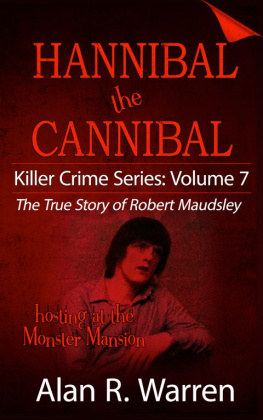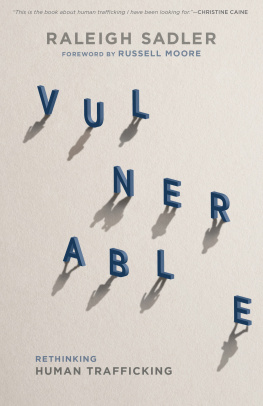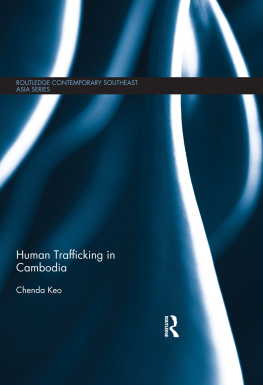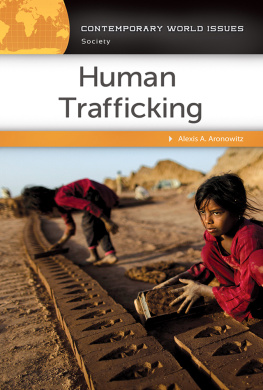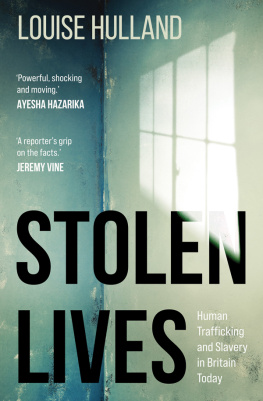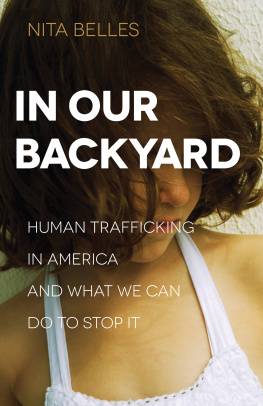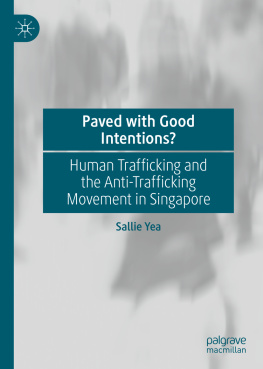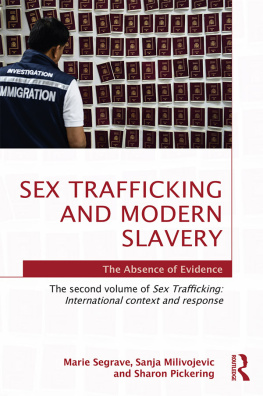T wo centuries ago, it took twenty years of activity from the antislavery movement in Britain to bring about the ending of the slave trade. And it was fifty years from its formation before it saw the passing of the Abolition of Slavery Act. This time-span seems extraordinary now, when people and governments throughout the whole world agree that slavery is wrong. Yet, all this time later, a movement is, once again, urging us to respond to global injustice. The growing anti-trafficking campaign challenges us to address the iniquity of modern day slavery.
Unlike the early era of slavery, trafficking is not presented as a normal part of a cultures economy. Rarely in public evidence, it is often hidden in the modern globalization of transport and work, for it is not unusual for people to travel vast distances for employment. By its very nature, therefore, trafficking is a crime that often goes unreported, for victims rarely have access to the law, or even to the language of the place to which they are taken. Trafficked victims can be shut away, out of public gaze, or even presented simply as migrant workers. Yet the underlying exploitation, manipulation, denial of freedom and choice remain the same. Now, a complex global structure of organized crime turns people into commodities, where their very bodies are appropriated for the use of others.
At one level, it is not difficult for Christians to respond to this appalling industry. Clearly, it is wrong. It is an abuse of power. It is linked to poverty and deprivation. It forces people against their will to work for others. It manifests a ruthless betrayal of the some of the worlds most vulnerable citizens. Yet the deeper issues are more complex. The largest proportion of trafficking is of women and girls into different forms of sex labor. This sits alongside the demand for prostitution evident in cultures across the globe, x and it requires us to reflect on our attitudes towards gender and sexuality. It challenges too the assumptions we can easily adoptwhich vary from labeling all those women as victims, or creating a false dichotomy between those who deserve justice, and those who operate through choice. Mindsets are important, because they can obliterate truth and affect our outlook and attitudes towards legislation.
This book is a vital tool in helping Christians to think through these issues, and offers some key theological insights. Most importantly, its focus is overtly biblical, recognizing the importance of the Bible in shaping our values, our framework of understanding, and how we see justice. The study is thorough and scholarly; the author is far more equipped than most of us to work through the complex nature of biblical interpretation and hermeneutics, and she does this with skill. The outcome is earthy and practical, as it moves us to ask important questions of how we should act and respond to this crucial problem in todays world.
Many theological books refine and develop areas that have been studied for decades, if not centuries. Yet Marion Carson cuts new ground. She takes an area outside the normal biblical curriculum, and offers a penetrating analysis of vital key questions. She reflects on historyshowing how the different assumptions that Christians brought to the earlier issues of slavery were tied up with unexamined principles of biblical interpretation. She studies the hermeneutical gap between pro-slavery advocates, who found legal endorsement of slavery in the Bible and so maintained it was ordained by God, and anti-slavery campaigners, who focused on biblical narratives of redemption and agape love to express Gods love for people and hatred of injustice. She treats us to a fascinating study of prostitution in the Bible, including offering various ways for understanding the whore metaphors. The result is a highly readable book that will refresh our own understanding and help shape our responsibility to bring about change.
What shines through for me is the authors own commitment. Her faithfulness as a believer is reflected in her faithfulness in presenting both the Bible and her interpretative framework. It is also reflected in the underlying pursuit of hope and redemption. Sin need not have the last word. But if slavery is to be defeated and justice triumph, Christians need to allow the Spirit of God to challenge our minds, raise our voices, and direct our actions. This book helps us on that journey.
Elaine Storkey
June 2015
T here is, at present, considerable confusion with regard to the Bible and its place within the life of the church. Some ignore the Scriptures altogether, while others claim that its principles and precepts inform every moment of their lives. Some say that they do not know, and will never know, what its documents might mean, while others are convinced that they do know and will brook no disagreement with their interpretation. There are, of course, many gradations between the two extremes. This state of affairs results not only in divisions within the church, but in the routine side-lining of Scripture in discussions regarding Christian practice.
The difficulties inherent in biblical interpretation for todays world are highlighted when we ask what Scripture might have to say about human trafficking. Over many years involvement in Christian anti-trafficking work, I have realized that there is a need to help Christians to bridge the hermeneutical gap between the worlds of the Old and New Testaments and our own. To put it bluntly, simplistic readings of Scripture are hindering a Christian response to human trafficking. Some churches refuse to talk about the subject, considering it too shameful to speak of. It is not uncommon for women who have been trafficked into prostitution to be shunned and punished by their churches on the grounds that they are unclean whores (citing, for example, Ezekiel 34 or Revelation 18). Female victims of trafficking are frequently blamed for their situation on the grounds that women are always responsible for the sins of men and that somehow it must have been their fault. Many Christians have reported to me that they have been actively prevented from becoming involved in anti-trafficking work, their church leadership having told them that they should not associate with sinners or that they should be focusing on their own communities. It is even still possible, on occasion, to hear the view expressed that slavery is in line with Gods will, because the Bible says so.
Part of the difficulty is, of course, that biblical hermeneutics is a complex and difficult exercise. We crave simplicity and directness, but, if we are conscientious in trying to avoid selectivity or naivet in our reading, this can prove elusive. For precisely this reason, speakers, writers, and practitioners often find it easier to base their deliberations on sociology, psychology, and even politics, without reference to the book we claim to be normative for our faith. Disciplines such as these have much to teach us, but if we believe that Scripture has something to say to the church then we must engage with it and try to hear its voice in our time. This book, I hope, will go some way to opening up the question and at the same time, provide a stimulus to theologically informed discussion as to how the church might respond to the tragedy that is contemporary slavery.


